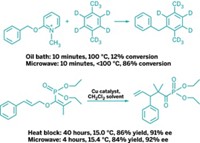Advertisement
Grab your lab coat. Let's get started
Welcome!
Welcome!
Create an account below to get 6 C&EN articles per month, receive newsletters and more - all free.
It seems this is your first time logging in online. Please enter the following information to continue.
As an ACS member you automatically get access to this site. All we need is few more details to create your reading experience.
Not you? Sign in with a different account.
Not you? Sign in with a different account.
ERROR 1
ERROR 1
ERROR 2
ERROR 2
ERROR 2
ERROR 2
ERROR 2
Password and Confirm password must match.
If you have an ACS member number, please enter it here so we can link this account to your membership. (optional)
ERROR 2
ACS values your privacy. By submitting your information, you are gaining access to C&EN and subscribing to our weekly newsletter. We use the information you provide to make your reading experience better, and we will never sell your data to third party members.
Synthesis
More On Microwaves
Additional experiments help chemists better elucidate the thermal effects of microwaves in heating chemical reactions
by Stephen K. Ritter
August 12, 2014
| A version of this story appeared in
Volume 92, Issue 32
A pair of Florida State University research teams has conducted a more thorough study of the thermal effects of using microwave reactors in organic synthesis. Gregory B. Dudley, Albert E. Stiegman, and coworkers have solidified their earlier findings that microwaves can produce localized heating effects that deviate from known kinetics parameters and accelerate reaction rates beyond what is possible with conventional heating. In one case the researchers show that microwave heating of an ionic reactant in a non-microwave-absorbing (nonpolar) solvent produces a reaction that behaves as if it were being heated at a temperature 20 °C higher than what was recorded (J. Org. Chem. 2014, DOI: 10.1021/jo501153r). In a second case, the researchers characterized the thermal effect by observing that a reaction carried out using variable microwave power to maintain constant temperature produces negligible rate enhancement, yet when operating at constant microwave power leading to a variable temperature, they can achieve up to a ninefold enhancement in reaction rate (J. Org. Chem. 2014, DOI:10.1021/jo5011526). Dudley and Stiegman postulate that selective microwave heating of the reactants, not just the bulk solution temperature, is behind the microwave phenomenon and that it could be exploited for new applications in organic synthesis.




Join the conversation
Contact the reporter
Submit a Letter to the Editor for publication
Engage with us on Twitter